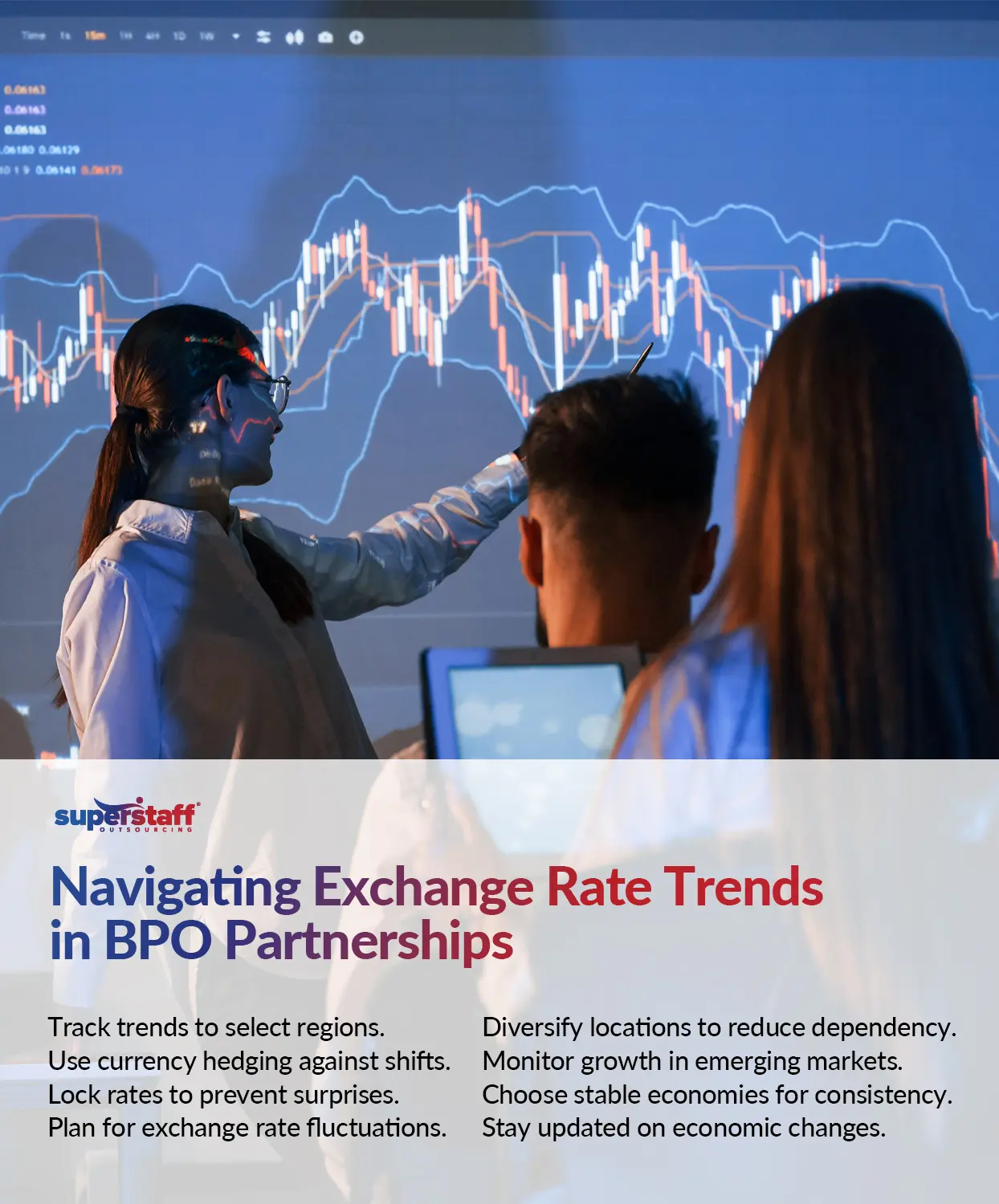
Exchange rates are the silent yet powerful variable in the success of any outsourcing partnership. What seems like a cost-effective BPO deal today can become a financial burden tomorrow if currency fluctuations aren’t part of the plan.
Many businesses overlook exchange rate volatility when selecting a BPO provider. Yet, it significantly impacts operational costs, impacts long-term financial planning, and can swiftly erode projected cost savings. Ignoring it puts your business at risk of unexpected expenses that affect your bottom line and strategic stability.
This blog explores how exchange rate shifts can influence your outsourcing strategy. More importantly, we’ll outline actionable strategies to mitigate risks, enhance cost efficiency, and safeguard your financial outcomes—ensuring your BPO partnership remains a reliable asset, not a liability.
Understanding Currency Exchange Rate Advantages
Companies worldwide are increasingly looking beyond their borders to tap into talent pools and cost-effective resources. However, they often overlook how outsourcing can drive savings through favorable currency exchange rates.
Let’s take a closer look at this phenomenon.
Cost Reduction Potential
Outsourcing to countries with weaker currencies saves money and fuels profit.
The logic is simple enough. Your stronger currency gives you more value for every dollar you spend. For instance, if a U.S. company outsources to the Philippines, the dollar’s strength ($1 = PHP58.66 as of writing) makes everything—from salaries ($4,500 in the U.S. vs. PHP45,157.46$800 in the Philippines) to office space and equipment—more affordable. It creates a streamlined, cost-effective setup that frees up funds to reinvest in growth and drive new business priorities.
Leveraging Exchange Rate Trends
Businesses often track exchange rate trends to pinpoint countries where the currency offers steady, predictable savings. Choosing a region, such as Southeast Asia, where most countries’ currencies are depreciating, cuts costs and makes it easier to plan budgets confidently over the long haul.
This way, businesses aren’t blindsided by sudden shifts in operational expenses. Actively monitoring these trends ultimately empowrs companies to make smarter, timely choices about where to set up their outsourced teams, capturing currency advantages and keeping costs under control.
While favorable exchange rates open up significant savings, currency fluctuations are unpredictable. What works in your favor today could shift tomorrow, especially if you’re in a long-term contract or have made significant resource investments.
Currency Fluctuations: Balancing Short-term Gains With Long-term Strategy

Since currencies are often unpredictable, leaning on currency advantages isn’t without its challenges. Those short-term savings are appealing, but it’s crucial to consider long-term currency shifts’ potential ups and downs to keep things profitable and stable in the long run.
Short-term Gains vs. Long-term Risks
A favorable exchange rate can make outsourcing a smart financial move, cutting costs and boosting the bottom line.
Due to a stronger home currency, companies benefit from affordable labor and resources. But there is a huge caveat. Currencies don’t stay put. They shift with economic trends, global events, and other market forces. If the currency in the outsourcing destination suddenly strengthens, those cost savings can quickly disappear, raising operational expenses and squeezing profits.
For instance, if a U.S. company outsources to a region with a weaker currency, but that currency unexpectedly strengthens against the dollar, salaries, rent, and operational costs can shoot up, wiping out the expected savings. That’s why it’s crucial to have a balanced approach and not rely solely on exchange rate advantages in an outsourcing strategy. Planning for these potential fluctuations can help keep outsourcing a winning strategy in the long run.
Impact on Budget Planning
Most (82%) of business failures are due to cash flow problems. Sadly, the ups and downs of exchange rates can make it challenging for companies in long-term outsourcing deals to stick to a budget. When rates fluctuate, expenses can suddenly spike, throwing off budget forecasts and making it harder to hit financial goals.
Without strategies like currency hedging, these changes can drive unexpected costs, complicate planning, and potentially threaten the long-term success of the outsourcing relationship. These strategies help lock in exchange rates or offset potential losses, making costs more predictable and budget planning easier.
Navigating Emerging Economies and Global Economic Trends

Outsourcing is a popular choice for businesses looking to cut costs, especially in emerging markets offering substantial savings. But these savings aren’t guaranteed to last forever. As the economies of outsourcing hubs grow, factors like currency increases and economic shifts can impact the long-term affordability of these partnerships.
For a sustainable outsourcing strategy, you must think beyond short-term savings and monitor broader economic trends and stability. Doing so ensures that your outsourcing decisions continue to make financial sense down the road.
Emerging Economies
Emerging markets are expected to drive about 65% of global economic growth by 2035, with countries like China, Vietnam, and the Philippines playing a central role.
Due to lower operational expenses, emerging markets are often attractive for businesses looking to reduce costs. But as these economies grow and stabilize, things can change. One key factor to watch is currency appreciation. Countries that once offered low-cost advantages may see their currencies strengthen as their economies develop. Over time, this can eat into the original cost savings that made these locations so appealing in the first place.
Businesses with long-term outsourcing relationships need to track economic changes. By regularly reviewing financial indicators in their outsourcing locations, companies can make smarter decisions about keeping operations where they are, expanding, or moving elsewhere. For example, if a country’s currency shows signs of long-term appreciation, it might be time to explore other outsourcing options or renegotiate terms to mitigate rising costs.
However, while emerging markets offer huge potential, companies must monitor how economic, political, and environmental changes impact their long-term cost savings and operational decisions. Regularly reassessing the landscape is critical to staying ahead of the curve.
Alignment with Global Economic Trends
When selecting an outsourcing destination, businesses should consider more than just the economic conditions of individual countries. They must also account for economic sanctions, trade policies, and geopolitical developments. Countries with stable trade agreements, monetary policies, and an openness to foreign businesses provide more predictable outsourcing environments, ensuring cost stability over the long term. For instance, countries with strong trade deals and low inflation rates are more likely to offer reliable cost structures, making them an attractive choice for outsourcing.
In the current global climate, geopolitical shifts play a significant role in shaping trade flows. As the International Monetary Fund’s Gita Gopinath pointed out, recent crises — such as the COVID-19 pandemic and the Russia-Ukraine conflict — drive nations to rethink their economic ties and reduce dependence on the U.S. dollar.
These shifts mean businesses must stay ahead of changing regulations, tariffs, and trade dynamics, which can significantly affect outsourcing partnerships’ cost-effectiveness. Staying informed about global economic shifts and trade policies empowers you to make more informed, strategic decisions that safeguard your future success in an increasingly fragmented world economy.
The Role of Economic Stability and Inflation in Outsourcing Success
Outsourcing can deliver impressive cost savings, but economic factors like inflation and instability in the host country can undermine its financial benefits.
When inflation spikes, or the economy becomes volatile, it can eat into those savings, affecting operational costs and making it harder to retain top talent. For businesses looking to build a sustainable outsourcing strategy, it’s crucial to evaluate how inflation and economic stability will shape not only costs but also the quality of the workforce. Partnering with the right BPO provider who understands these dynamics can help ensure that your outsourcing efforts remain cost-effective and resilient, no matter what the future holds.
Inflation’s Impact on Operational Costs
Inflation can significantly impact outsourcing costs, driving up expenses across the board.
As inflation rises, so do the costs of essential resources such as wages, utilities, and office supplies. While a dip in currency value may offer temporary relief on wages, high inflation quickly erodes these savings, making outsourced operations more costly than initially anticipated. For instance, if inflation surges in an outsourcing destination, the increased cost of living often leads to demands for higher wages, diminishing the financial benefits of outsourcing.
One smart strategy to mitigate the impact of inflation is to partner with countries with lower, more stable inflation rates. Outsourcing to countries such as the Philippines, where inflation recently hit a four-year low, helps you cushion the blow of rising costs, ensuring you maintain financial advantages without minimizing your savings.
To further safeguard against inflation’s effects, you must consistently monitor inflation trends in your outsourcing locations and explore solutions like fixed-cost contracts or contingency plans. By staying ahead of inflationary shifts, you ensure that outsourcing remains a cost-effective strategy even as inflation fluctuates, allowing you to benefit from global partnerships without disrupting your budget.
Economic Stability and Talent Retention
Economic instability can cause major headaches when it comes to keeping your outsourced talent happy and productive. In areas where the economy is shaky, skilled workers are more likely to leave for more stable opportunities, leading to higher turnover rates. For businesses relying on outsourced teams, this means more money spent on training, longer onboarding processes, and the potential for service disruptions.
Partnering with outsourcing providers in economically stable regions is crucial to avoiding these issues. Look for outsourcing hubs that deliver excellent service and prioritize employee retention and engagement.
The Philippines is an excellent example of this. It ended 2023 as the fastest-growing economy in Southeast Asia, with a growth rate of 5.6%, just shy of the government’s target of 6.0 to 7.0%. What does this mean for you? Simple. Employees living comfortably within their means are much less likely to leave their jobs. So, in this context, a stable economy means higher standards of service quality and lower risk of workforce churn.
Inflation and the economy inevitably affect business. While inflation can drive up costs, economic instability can lead to high turnover, putting your operations at risk. By staying ahead of these factors and working with reliable vendors, you can create a long-term outsourcing strategy that keeps costs down and your talent engaged, no matter what the economy is doing.
Mitigation Strategies for Currency Risks
Currency fluctuations can shake up the cost-effectiveness of outsourcing deals. Fortunately, there are ways to handle these ups and downs. Taking a proactive approach and using smart risk mitigation strategies empowers you to stay on top of exchange rate volatility and steady your financials.
Let’s look at a few innovative strategies you can leverage to protect your bottom line.
Hedging and Forward Contracts
Managing currency risk can often feel like a juggling act, but financial tools like hedging and forward contracts are your safety net. These strategies allow you to lock in exchange rates for future transactions so you’re not caught off guard by sudden shifts in currency value. With stable rates, businesses can budget more accurately and avoid surprise costs.
For example, if a company outsources to a country with a volatile currency, it might enter a forward contract to fix the exchange rate for a set period. This way, even if the currency strengthens unexpectedly, the company won’t face higher expenses. While these tools provide solid protection, they also come with costs and require careful management to ensure they align with your broader financial goals.
Diversification Across Multiple Locations
Another smart way to manage currency risk is diversifying your outsourcing operations across multiple locations. Spreading operations across different countries helps reduce your reliance on one economy, cutting down exposure to currency volatility in any single region. For instance, if one country’s currency spikes, operations in other countries with more stable currencies can offset the increased costs.
Diversification also makes your business more resilient. It allows you to adjust quickly to economic shifts, geopolitical events, or currency changes. By building a well-balanced portfolio of outsourcing locations, you can keep your cost structure more predictable, strengthening the stability of your global operations.
In short, understanding currency dynamics and having the right strategies in place are key to creating a solid outsourcing model. Hedging, forward contracts, and geographic diversification are all powerful tools to protect your business from currency fluctuations.
A proactive approach ensures that outsourcing remains a strategic asset supporting long-term growth, even when the market shifts.
Maximize Savings by Leveraging Exchange Rates
With the Philippine peso traditionally weaker than the U.S. dollar, your business can take advantage of significant cost savings on labor, office space, and other operational expenses. This allows you to access top-tier talent at a fraction of the cost while maintaining high-quality service and efficiency.
When choosing the right BPO provider for your company, SuperStaff is a trusted partner in Southeast Asia’s fastest-growing economies. By partnering with us, you’ll benefit from lower operational costs and gain access to a highly-skilled, well-trained workforce ready to drive your business forward. Leverage the Philippines‘ competitive advantage to boost your bottom line and stay ahead in a globalized market with SuperStaff.






